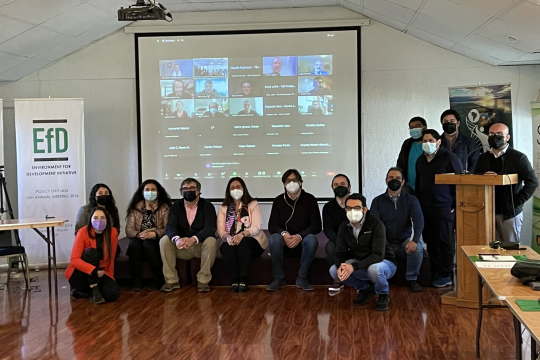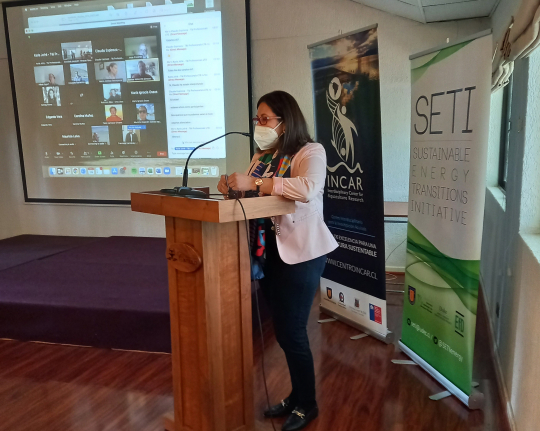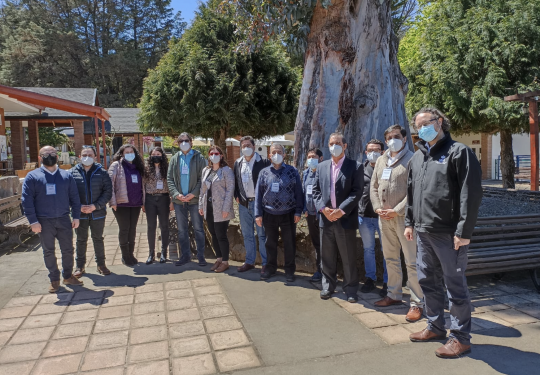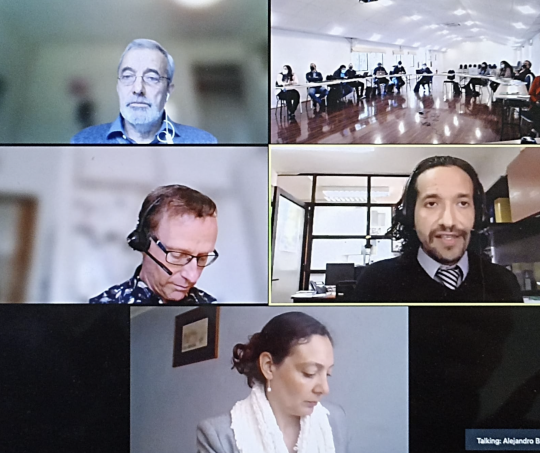Different stakeholders discussed cutting-edge research on topics such as climate change, aquaculture, mining, waste, water, and energy in the Seventh Annual Meeting of NENRE EfD-Chile on October 14 and 15.
Academia and policymakers met
"We are happy to meet again in a space that encourages conversation between different actors because we need not only different disciplines but also to talk and reach agreements between academia, citizens, and decision-makers," said Dr. Marcela Jaime the Director of the NENRE EfD-Chile in her welcoming remarks.
Gunnar Köhlin, Director of the EfD global network, said that “EfD Chile has been a pioneer in new conference formats, including in-person, virtual and now the hybrid modality. It is an inspiration for other EfD centers.”
Diversity is promoted
The Vice-Rector for Research and Development of the University of Concepción, Dr. Andrea Rodríguez, highlighted the work of the network:
"The strategic plan of the university values the initiatives that allow the sustainable development of the country, on all when they integrate a diversity of people, universities, and subjects, with an interdisciplinary approach, as is the case of NENRE EfD-Chile. This multiplicity of views is the only way in which we will be able to solve the complex problems that afflict us as a society."
Gender perspective is important
The meeting was held in a hybrid format, with some attendees meeting in person at the Catillo Hot Springs, Chile, and others virtually from different parts of Chile and other countries such as Sweden, United States, England, Brazil, Colombia, and Belgium.
Cristóbal de La Maza, Superintendent of Environment, participated in the panel on Energy and Gender and commented that "environmental and indoor pollution is the most serious and complex problem in Chile. We appreciate that this research focuses on the gender issue, because our immediate goal is to reduce the pollution and women are great catalysts for this type of social transformation”.
This panel also included a keynote lecture by Dr. Marc Jeuland, from Duke University. Other participants were Pilar Lapuente, from UN Environment, and Eduardo Schleef, from the Regional Ministry of the Environment of the Araucanía Region. It was moderated by Walter Gómez, from the Universidad de La Frontera and a member of EfD-Chile.
“Eating habits must change”
The other panel of open discussions had the theme "Aquaculture, externalities, and solutions from public policies" and was led by Håkan Eggert from the University of Gothenburg. He stated that sustainable aquaculture emits considerably less CO2 than the production of other proteins animals and similar to vegetables.
“If we want to reduce global warming, we must change our eating habits,” he said. It was moderated by Jorge Dresdner, a member of EfD-Chile and researcher at the University of Concepción.
Valeria Astorga, from Sernapesca, stated that "small-scale aquaculture is an area that we are promoting and that has greater benefits for the communities."
Alejandro Barrientos, from the Undersecretariat of Fisheries and Aquaculture, pointed out that "the social component, how people perceive the fishing industry, is one of our greatest concerns to achieve truly sustainable aquaculture."
Studies received feedback
During the parallel presentations, topics such as Economics of marine resources, the economics of waste management, climate change, and energy presented by researchers from ten different universities were discussed with representatives from the Institute for Fisheries Development, the Center for Public Studies, and the Forestry Institute.
Ongoing studies received feedback from the experts during the parallel sessions of Advanced Human Capital Training in Latin America. Young researchers showed their work on topics such as protection of forests in peasant reserve areas of Colombia, effects of incentives on the demand for residential water, private benefits of air pollution reduction policies in Chile, preferences for recycling systems, domicile, heuristics as determinants of agricultural supply, and analysis of subsidies for the modernization of irrigation and the water scarcity policy in Chile.
If you are interested in any of the presentations at our conference, please contact the Project Coordinator of NENRE EfD-Chile, Cristóbal Vásquez, at the email vasquezquezada@gmail.com.
Journalist at NENRE EfD-Chile



